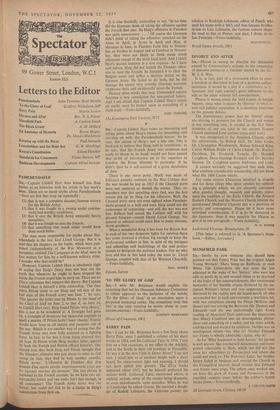DIVORCE AND AFTER SIR,—Pharos is wrong to describe the discussion
roused by Convocation's attitude to the remarriaeL of innocent parties as a 'rumpus' started by the AL W. J. S. Weir.
It is, in fact, part of a protracted effort to rctai• a freedom of discretion in face of a growing authori tarianism. It would be a pity if a contributor to ti Spectator lent your journal's great influence to or% side or the other without full consideration,
Pharos is wrong about the 1604 Canon. It forbids bigamy, since what it means by 'divorce' is what v., now call judicial separation. It is therefore irrelevant to the present debate.
The discretionary power that we 'liberal' clergy are striving to preserve for the Church and nation is not something new. It existed in the first three centuries of our era (and in the ancient Eastern Church persisted from earliest times until now).
It was recognised in the Anglican Church, since the reformation, by Bishop Hall, Dr. John Cosin, Dr. Christopher Wordsworth, Bishop Edward King, Canon William Bright of Christ Church, Dr. Randall Davidson, Dr. Frederick Temple, Dr. Mandell Creighton, Dean Hastings Rashdall and Dr. Hensley Henson. Dr. Creighton quotes Andrewes and Laud.
It cannot seriously be suggested that such men, who combine considerable scholarship, did not know what the 1604 Canon meant.
For some sincere Christians involved in tragedy and for those clergy who incur censure for uphold. ing a principle which, we are sincerely convinced after careful thought, research and prayer, repre- sents the tradition of the Early Church, the Ancient Eastern Church, and the Western Church (except the unreformed Mediaeval Church) this is a problem of gravity and consequence. Please let it have more informed consideration, if it is to be discussed in the Spectator, than it was possible for Pharos to give it in one paragraph.—Yours faithfully, [This letter is referred to in 'A Spectator's Note- book.'—Editor, Spectator.]










































































 Previous page
Previous page